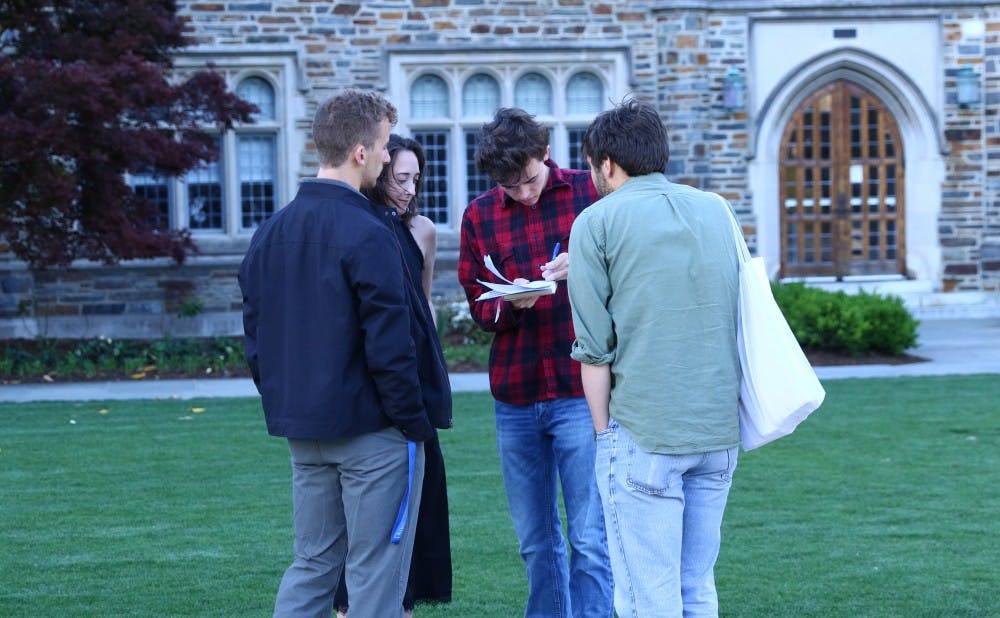Last Thursday afternoon, the Bryan Center plaza was packed with music, dancing and bright-eyed prospective students as groups advertised their upcoming showcases and fundraised for charities or future events.
Amidst the hubbub was a group of students manning a table with posters. Like many of the student groups that frequent the BC plaza they were asking for money—but not from passerby. The students were asking for increased pay from the University for graduate students as part of the Duke Graduate Student Union's pay campaign.
Claire Ravenscroft, a fourth-year Ph.D. candidate and member of the DGSU pay working group, explained that the central pillar of the pay campaign is that Duke should pay all campus workers $15 per hour—including graduate students.
“If this is going to be a fair campus and a prestigious campus that likes to compare itself to other R1, top tier institutions, they should begin by making good on their promises and treating everyone on campus with the respect and dignity that they deserve,” Ravenscroft said.
All Duke employees and full-time contract workers who work more than 20 hours per week and 36 weeks per year have been promised a $15 per hour wage by 2019. John Zhu, senior public affairs officer of the Duke Graduate School, explained in an email that Duke Ph.D. students cannot be assigned to research or teaching assistantships that exceed an average of 19.9 hours per week so their primary focus is their academic progress and dissertation.
Zhu stated that graduate students already receive more than $15 per hour on average based on the current stipend schedule. According to Zhu, a Ph.D. student’s “current stipend significantly exceeds $15 per hour” and actually “averages to more than $29 per hour.”
"In addition, Ph.D. students get benefits that no other Duke students or employees receive, including free, platinum-level health insurance for six years; guaranteed tuition coverage for five years (worth more than $175,000 total); tuition scholarships for the sixth year for those who do not have other sources of tuition support; up to $5,000 a year to help cover the cost of child care; free access to Duke recreational facilities for five years; and access to grants to help cover unexpected medical expenses," Zhu wrote.
But DGSU's petition claims that making more than $15 per hour is not always the reality for graduate students.
Members of DGSU dispute Duke's summer funding claims in its Tuition, Fees and Stipends Schedule. The nine-month pay schedule for 2017-2018 is listed as $22,912 while the 12-month pay schedule is $30,550 in the Graduate School's pay schedule.
The students' petition states that the stipend for Ph.D. students is "usually around $22,000 a year." To reach the $30,550 mark, students need to secure $7,637 in funding for the summer. Casey Williams, a second-year Ph.D. student, pointed to the question of summer funding availability and caps as a primary concern for the graduate students who are not on 12-month pay schedules.
"In my opinion, it's misleading to publish a document implying grad students make $30,550 a year (and to tell this to reporters) without explaining it, providing evidence or acknowledging the caveats," Williams wrote in an email.
Zhu wrote that the Graduate School does try to help make up this funding gap.
"The Graduate School provides a significant number of summer research fellowships that help bridge the gap for students on nine-month funding," Zhu wrote. "Those fellowships are intended to provide a meaningful level of summer support to as many students as possible with The Graduate School's available resources."
In addition to guaranteeing Ph.D. students who work as assistants a minimum yearly wage of $31,200, the petition also calls on the University to shift the nine-month pay schedule to a 12-month one so that they make a living wage year-round, have the funding cycle begin in August to match the academic year and provide a $1,000 stipend to each incoming graduate student worker to help with relocation.
At their BC plaza event, DGSU members stood next to a display covered with bright sticky notes and posters that asked "What does Duke owe you?"
“This could be a dollar amount, in terms of ‘Duke promised me I would get paid $15 per hour, but I don’t make that much money,’” Ravenscroft said. “’This is the difference between what they promised and what I actually get.’ Or it could be something more general like ‘Duke owes me an environment free of sexual harassment and discrimination.'"
DGSU members reached out to Provost Sally Kornbluth at the beginning of April for a meeting and after an initial exchange they planned to take the "Duke Owes You" poster event to the Allen Building to deliver the petition at 4 p.m. However, Kornbluth responded on April 17 that she would be willing to meet with them about the campaign. Accordingly, DGSU changed plans.
“[Kornbluth] has agreed to meet with us in May, so we are not doing that portion of today’s event,” Ravenscroft said.
Hannah Rogers, a fifth-year Ph.D. candidate and coordinator of the DGSU communications committee, emphasized that she hopes for all workers to be treated fairly and get the respect they deserve.
“I look forward to working with Duke to make this an even better place to work,” Rogers said.
Get The Chronicle straight to your inbox
Signup for our weekly newsletter. Cancel at any time.

Stefanie Pousoulides is The Chronicle's Investigations Editor. A senior from Akron, Ohio, Stefanie is double majoring in political science and international comparative studies and serves as a Senior Editor of The Muse Magazine, Duke's feminist magazine. She is also a former co-Editor-in-Chief of The Muse Magazine and a former reporting intern at PolitiFact in Washington, D.C.

